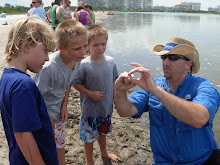To view the article online visit: http://www.nola.com/business/index.ssf/2011/07/new_federal_policy_aims_to_exp.html
 The federal government is moving to open up large swaths of coastal waters to fish farming for the first time in an effort to decrease Americans' dependence on imports and satisfy their growing appetite for seafood.
The federal government is moving to open up large swaths of coastal waters to fish farming for the first time in an effort to decrease Americans' dependence on imports and satisfy their growing appetite for seafood.More than four-fifths of the fish, clams, oysters and other seafood Americans ate in 2009 was imported, according to the latest figures from the National Oceanic and Atmospheric Administration. Those imports have soared in the past decade as U.S. production lagged while other nations ramped up their sea-farming. American seafood consumption, meanwhile, grew from just over 4 billion pounds in 1999 to nearly 5 billion pounds in 2009.
To encourage domestic production, NOAA and the Commerce Department issued new policies last month intended to open up federal waters to fish and shellfish farms. Those waters start three miles offshore in most states and extend out to 200 miles. Most U.S. marine fish and shellfish farms are now in state waters close to shore, and none exist in federal waters.
Michael Rubino, who heads NOAA's aquaculture program, said expanding the area where fish farming is allowed will boost production, create new jobs and help ease concerns that some imported seafood may be tainted with industrial wastes.
Aquaculture now accounts for half of the world's seafood production. But in 2009, less than 2 percent of the seafood that ended up grilled, baked or fried on American tables was grown along U.S. coasts or in inland saltwater ponds.
"We'd like the U.S. to take responsibility for our consumption decisions, rather than just importing all this food," Rubino said.
He said the new policies should help cut the nation's seafood trade deficit, which reached $10.7 billion last year, and come as the Food and Drug Administration is urging people to eat more heart-healthy seafood.
The new policies establish a framework for allowing marine aquaculture to expand into federal waters. But before that can happen, the nation's eight regional fish management councils must create aquaculture plans for their regions, NOAA spokeswoman Connie Barclay said. Then federal regulators will craft more specific rules for the farms, with protections for wild species and coastal and ocean ecosystems, she said.
The Gulf Coast has already started work on its management plan, and proposals are in the works to adapt unused oil and natural gas platforms in the Gulf for fish-farming.
Bob Rheault, executive director of the East Coast Shellfish Growers Association, supports the expansion, saying it can take years to get some state permits to start a shellfish farm. His group represents about 1,000 shellfish growers from Maine to Florida who sell about $100 million in clams, oysters and mussels a year.
The opening and leasing of federal waters would help grow the shellfish industry, which already accounts for two-thirds of U.S. marine aquaculture production, Rheault said, but he doesn't expect the new policies to immediately lead to "huge changes."
"This isn't the first aquaculture plan put out by NOAA, and I'm sure it won't be the last," he said.
Environmental groups fear the new policies will lead to big factory-style fish farms off U.S. shores. Sebastian Troeng, vice president for marine conservation with Conservation International, said raising salmon, other fish and shrimp requires large amounts of feed made from smaller ocean fish, taking food away from declining wild fish populations. And he notes that salmon, the primary saltwater fish farmed in the U.S., can spread disease and parasites to wild fish and excrete waste that depletes ocean oxygen.
The U.S. and other countries need to pursue aquaculture in a way that "puts as little demand on the environment as possible," Troeng said.
The new federal initiative includes a push for more research to reduce marine aquaculture's environmental impact and expand inland production.
Advances have already opened up the potential for farms far from coastal areas, such as the saltwater shrimp operation Fowler, Ind., grain farmer Darryl Brown opened last year about 600 miles from the Atlantic Ocean. He now raises hundreds of pounds of Pacific white shrimp a month in an old barn that once held horses and cows.
A humid addition to that barn now holds six 6,600-gallon tanks filled with a swirling mix of brownish saltwater and bacteria that break down the crustaceans' waste, allowing them to thrive.
"The little guys can really jump," Brown said earlier this month as several shrimp vaulted from one tank as he pulled away a protective netting to scoop some up.
Brown sells the mature shrimp live for $15 a pound to restaurants, at farmers' markets and to visitors to his farm in Fowler. So far, he said he's sold all he's raised.
But Brown's farm, which NOAA says is one of only about a half-dozen of its kind nationwide, is small compared with plans in the works for offshore farms.
Zach Corrigan, acting director of Food & Water Watch's fish program, said corporate interests are pushing big aquaculture to the detriment of the environment. He said the new policies give short thrift to innovative, lower-impact aquaculture systems and focus on expanding fish-farming into federal waters.
"You're looking at a policy that's very much set on promoting the wrong kind of fish-farming," he said.




No comments:
Post a Comment